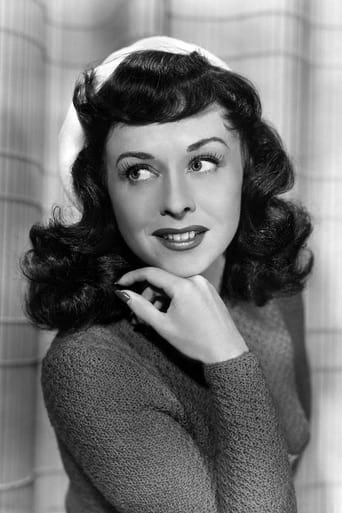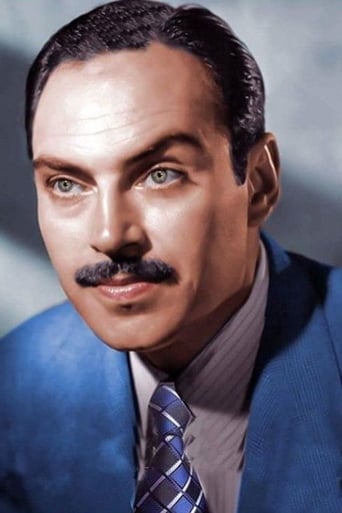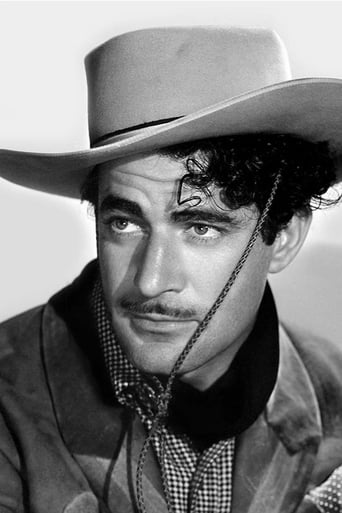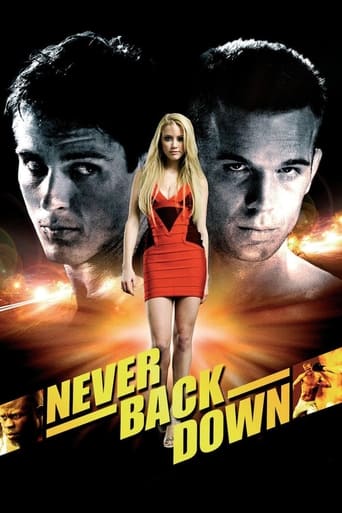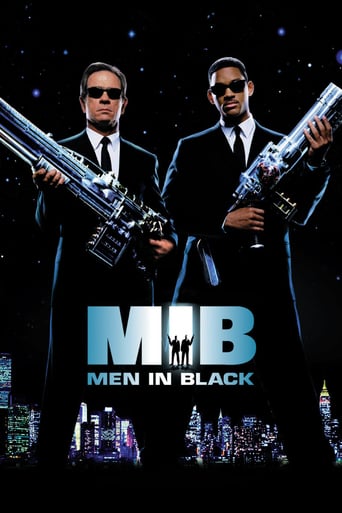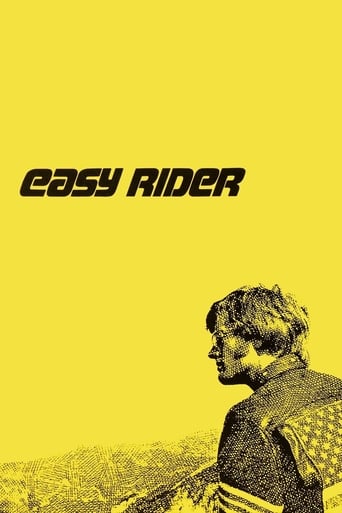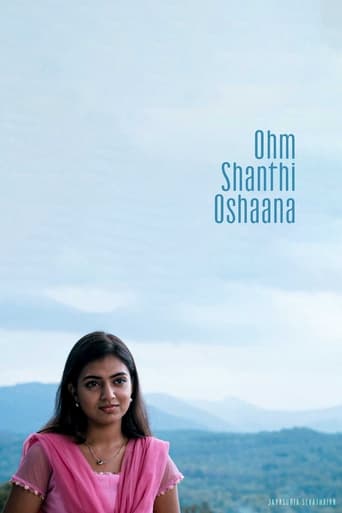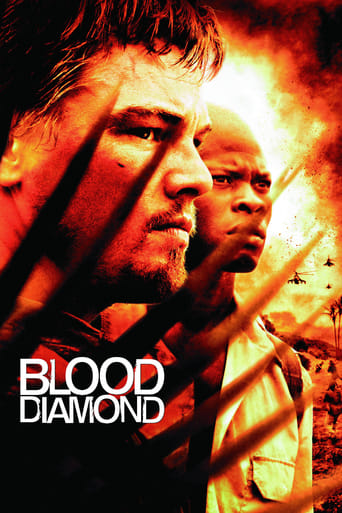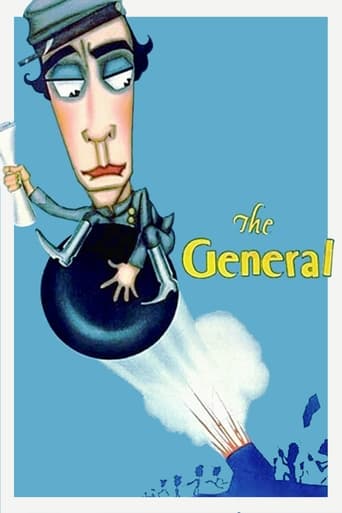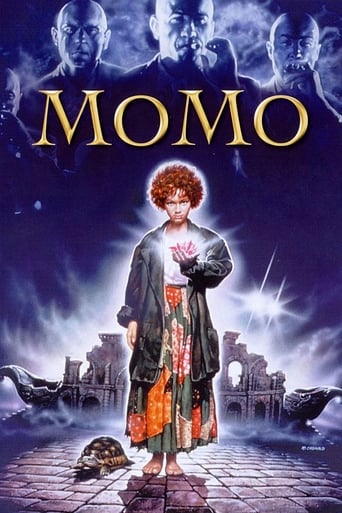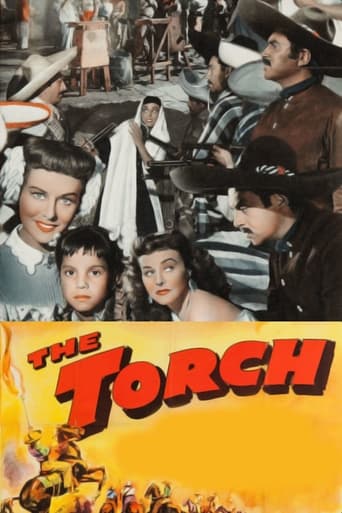
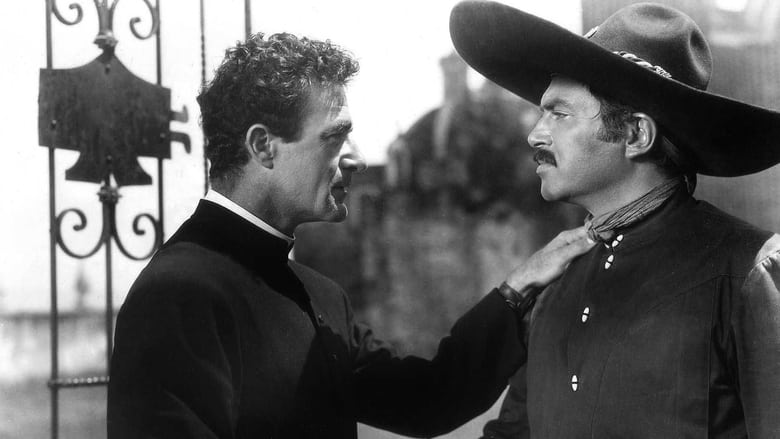
The Torch (1950)
The story of a fear-inspiring revolutionary general who develops a passion for the daughter of a wealthy villager. It's hate at first sight so far as the girl is concerned, but this will soon change.
Watch Trailer
Cast


Similar titles
Reviews
*Spoiler/plot- 1950, An emotional young woman promised to wed an American doctor gets a civics lesson from a bandito general and her town's villagers after a Cholera outbreak during Mexico's revolution era.*Special Stars- Paulette Goddard, Pedro Armendariz, Gilbert Roland,*Theme- People are people all over the world and love is love.*Trivia/location/goofs- A strangely cast film with fair haired and blue-eyed Paulette Goddard. Watch for 'Egyptian No. 7' heavy body make-up in scenes on some 'gringo' performers when needed. Film shot in Mexico.*Emotion- An enjoyable but rather crazy film of early Mexico, banditos, beautiful senoritas, village people, 'The Revolution', and what else? This film is a wonderful character comedy that is well acted. It's worth experiencing, at least once for the emotional acting and fast dialog.
You have to have like zero sense of Mexican history and culture not to understand the multiple levels of thematic development and narrative going on in this film. And unfortunately some of the reviews on this film evidence just that lack of sense.The Mexican revolution (roughly 1910-1920) was one of the most confusing - and bloodiest - in the annals of national political developments in the West. Perhaps only the Spanish Cuivil War could equal it for ferocity, and that only lasted less than half as long. An entire generation was shaped by the slaughter but also by the struggle to establish a national identity at last committed to some principle of legitimate democratic governance. The legacy - and the problems -continue.The leading male, General Reyes (based loosely on Zapata), is a complex character; he is hardly a saint - he passes judgment on a wealthy businessman (who has raise the prices of necessities to prevent their purchase by the poor) and has him executed. Is he authoritarian murderer and thief? Or is he trying to establish and enforce a new law? Can this be determined in a time of revolution, when the very question of what constitutes legitimacy is at issue? Yet we are given to know that he can love individuals - and also the people as a whole, when an influenza epidemic breaks out and he orders his men to help the stricken, even at the risk of their own lives - and his.The relationship between Reyes and the wealthy landowner's daughter Maria will probably not make much sense unless you understand that Mexican culture is profoundly Romantic in the 19th Century usage of that term. Both Reyes and Maria are fiercely struggling to determine how to maintain their individuality while pursuing a courtship threatening to engulf them both. Their resolution - allowing the revolution to seal their fates together - is pure (Percy) Shellyan. (This is a very tough-minded romance, and only a true Romantic would know what that means. The closest Hollywood came to it is Gone With The Wind which this film resembles, as a rather compressed variant at 80 minutes - and maybe Casablanca.) As to the film-making - it is glorious - absolutely beautiful cinematography, exquisitely taut direction, brilliant performances by the leading actors. The editing is a bit rugged, but it may have to be. I was at first confused by the influenza epidemic sequence - it is all smoke, darkness, sudden jump cuts and time ellipses - until I realized that this was as intended. Director Fernandez knew that his audience wanted a battle to decide the fates of the characters, but also recognized that this would spoil the romance. So the epidemic displace military engagement; nonetheless, it too is a battle, a battle to survive, and so must be both confusing and threatening, involving the loss of life and the definition of the personalities at risk and how they respond to it.That is intuitive film-making, and very risky, and brilliant if pulled off well. And I think it is. The ending, for me, was emotionally staggering, but only Reyes' and Maria's collective endeavors to survive the epidemic - and help others during it - could properly prepare me for it.An absolutely knockdown film. The existing prints - the one at Internet Archive I saw was a Mexican television edit, and I've read of worse - are not great, and maybe lacking episodes. Still what is available makes proper claim that this ought to stand as a (perhaps minor, but necessary) classic of commercial film-making. God knows what was going through RKO's Hollywood brains when they decided to make a Mexican film by a Mexican director (in English, with US actors), but thank god they did.(BTW influence: Undoubtedly seen by Sam Peckinpah who hired Fernandez to play Mapache in the Wild Bunch - note certain character similarities. Probably also seen in Europe, where it would have earned more respect than in the US, I suggest Sergio Leone may very well have been a fan, note similarity of certain shots, certain relationships, certain characters, to those in The Good, The Bad, The Ugly.)
While a distinguished film-maker in his native country, director Fernandez is perhaps best-known today for playing the heinous General Mapache in Sam Peckinpah's seminal THE WILD BUNCH (1969); for the record, later he was also the one to make the titular request in the same director's BRING ME THE HEAD OF ALFREDO GARCIA (1974). This genuinely oddball Western, then, was a Hollywood remake of Fernandez's own previous critical success ENAMORADA (1946) proving once again that the tradition in Tinseltown of looking for hot properties (when it comes to both subjects and their creators) in foreign lands is indeed a long-standing one; unfortunately, the end result here begins promisingly enough but gradually peters out. Anyway, apart from the director, Pedro Armendariz also reprises his earlier role of the Bandit General (which is how the film was known in the U.K.), while associate producer Paulette Goddard unwisely chose herself for the role of the leading lady. Ostensibly the town beauty, Goddard is far too old for the part but, sporting a completely misconceived schoolgirl look and playing it utterly over-the-top, her performance is forever threatening to bring the whole film crumbling down with it! Luckily, Fernandez gives the whole a remarkably visual texture (straight from the very opening scene in a glass factory) that lends it a presciently "Spaghetti Western" feel and the intermittent, awkward instances of goofy humor (including Goddard sending Armendariz literally flying off his horse into the air with a firecracker!) only serve to reinforce this impression. The third star featured here is Gilbert Roland but his role of the taciturn town priest (and old school friend of Armendariz's) is clearly subservient to the main couple who, inevitably, form a tenuous triangle with Goddard's dullish fiancée. The Mill Creek DVD I watched was a typically substandard edition that failed to do justice to celebrated cinematographer Gabriel Figueroa's (also from the original Mexican production) lyrical shots, and the hiss-laden soundtrack was similarly hard to sit through.
.I saw the film when I was 14 years old. It was on TV in the mid fifties. I hardly remember the story, but it was about a Pancho Villa type revolutionary who decides to retreat from the town wherin dwells his lady-love. The images from the film have remained crisp and clear in my mind, both sight and sound after all these years, moreso than any film I have seen since. Most well remembered was the opening scene in the glass blowing shop, and the final retreat from the city at the film's end. This is not a very good reviw of the film, just an old fellow's happy remembering. Sadly, I don't know anyone else who has seen it, and I have not been able to find the film on tape.


